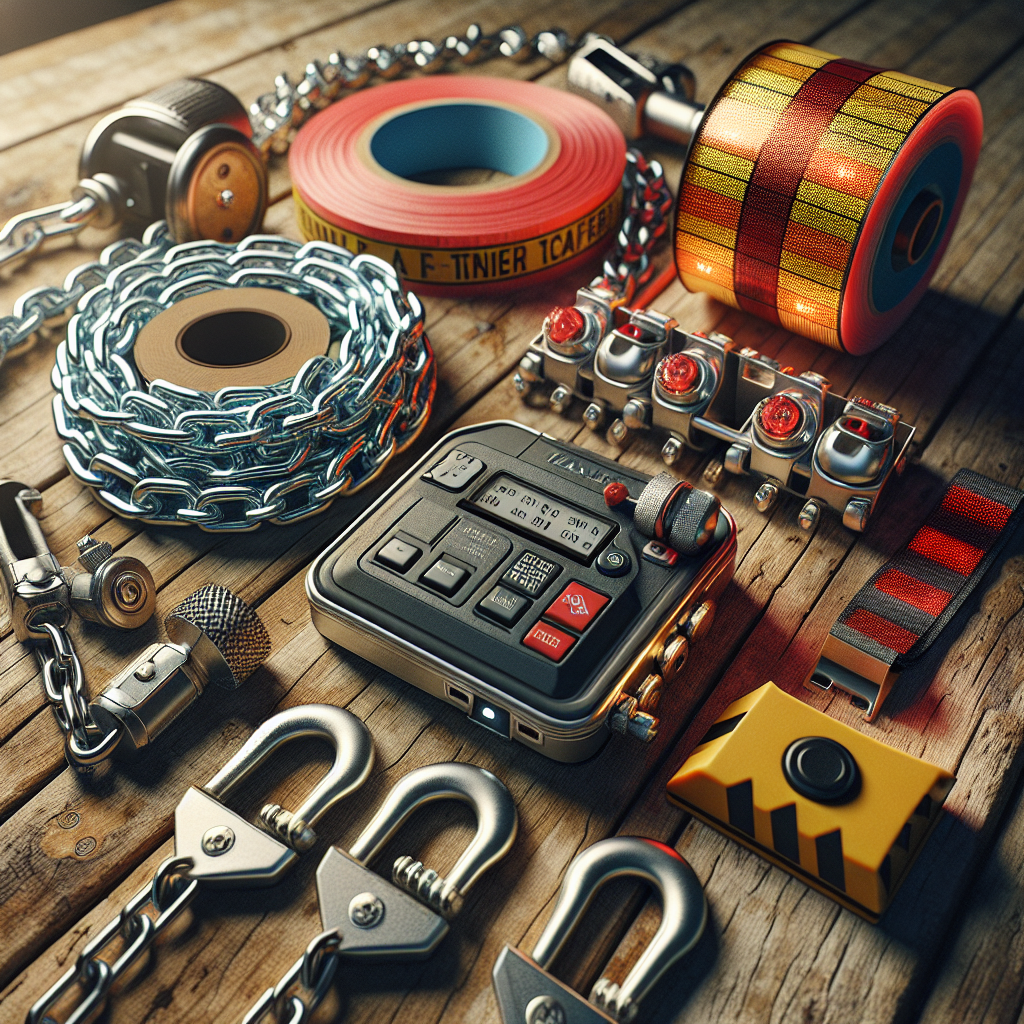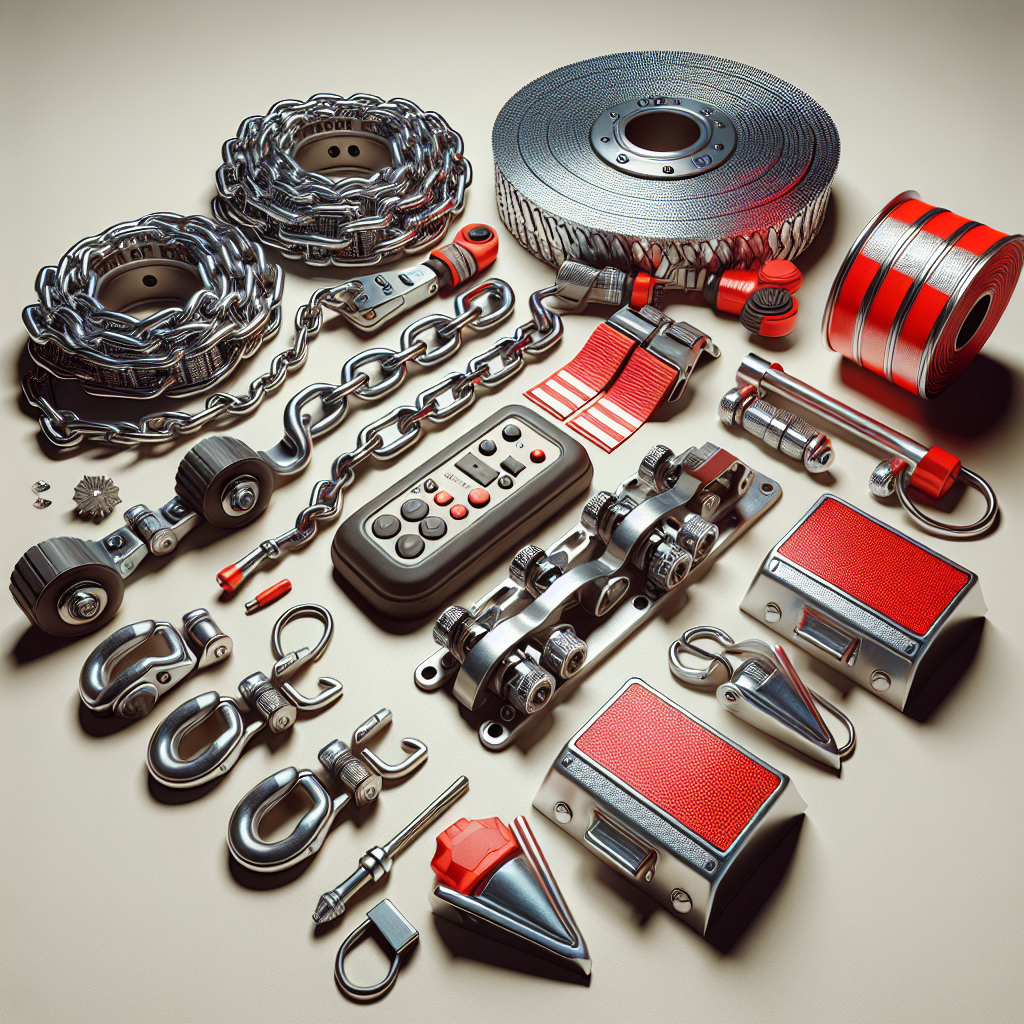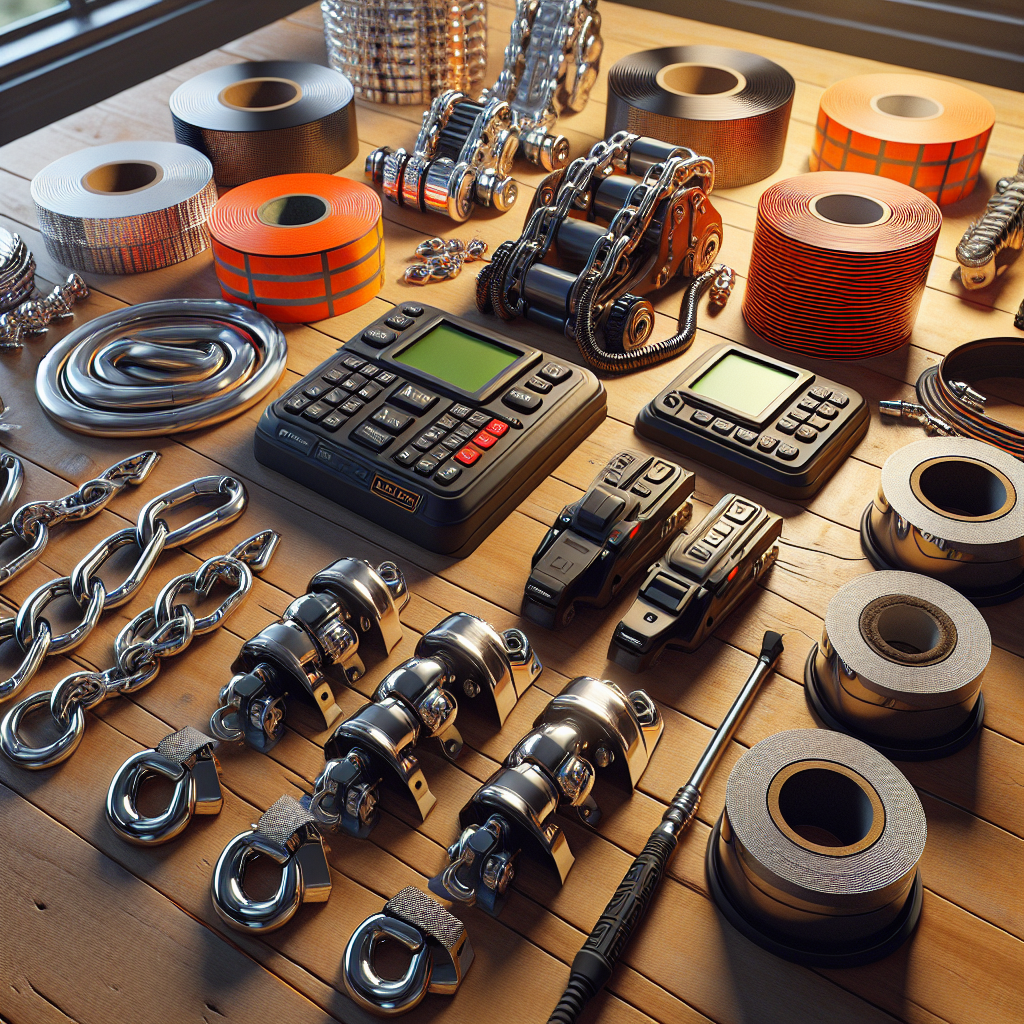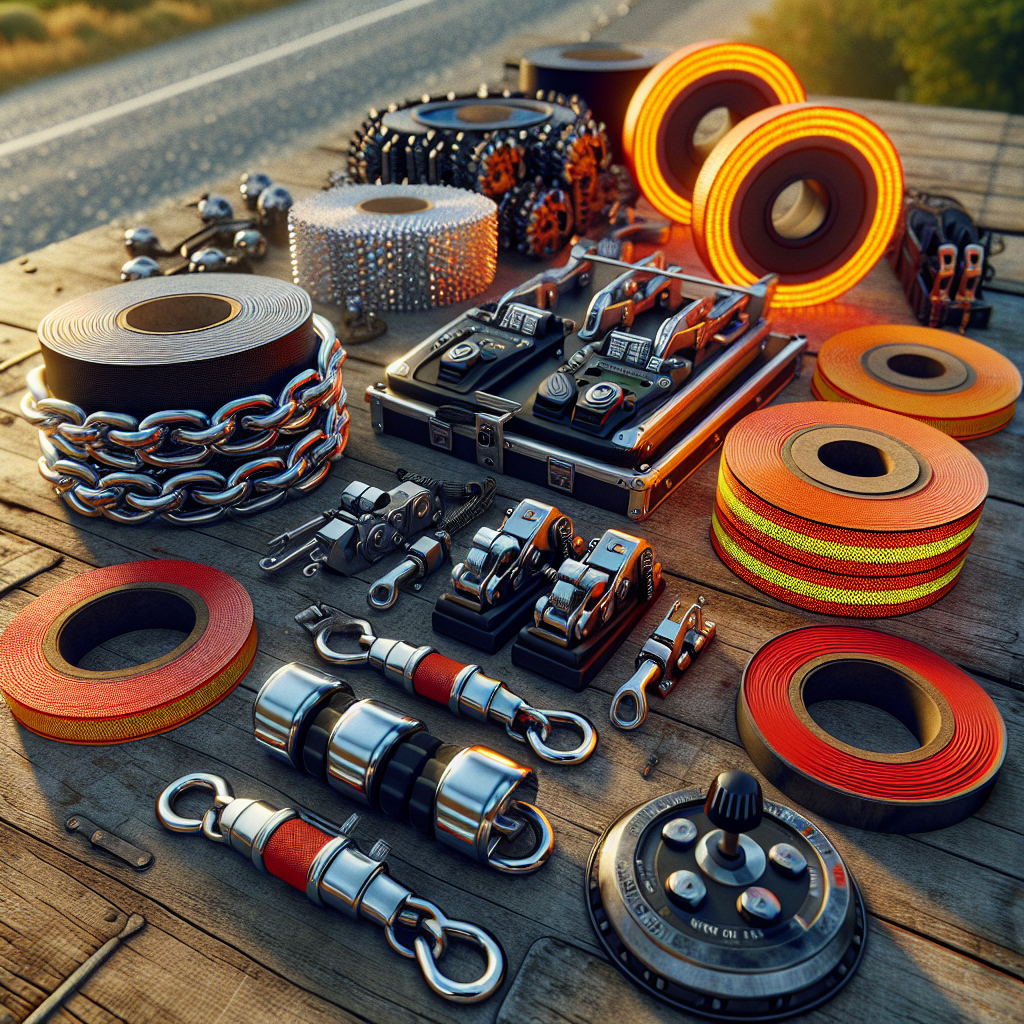When it comes to ensuring a safe towing experience, understanding the **importance of trailer safety gear** cannot be overstated. Properly equipping your trailer not only enhances safety but also minimizes the risk of accidents, which can lead to costly repairs and potential injury.
Trailer safety gear encompasses a range of essential equipment designed to enhance the stability, visibility, and control of your trailer. Some of the most critical components include:
- Safety Chains: These provide a backup connection between the tow vehicle and the trailer, ensuring that if the hitch fails, the trailer remains attached.
- Brake Controllers: These allow for synchronized braking between the tow vehicle and the trailer, enhancing control during sudden stops.
- Reflective Tape: This increases visibility to other drivers, especially at night or in poor weather conditions.
- Wheel Chocks: These prevent movement when the trailer is parked, adding an extra layer of safety when loading or unloading.
Each of these items plays a crucial role in maintaining safety on the road. Moreover, investing in quality trailer safety gear can significantly reduce the likelihood of catastrophic failures. Regular maintenance and checks of this equipment are equally important to ensure everything functions correctly.
Don't take chances with your safety. Tow with peace of mind, knowing that trailerwatchdog is standing guard.
Key Components of Essential Trailer Safety Equipment

Understanding the key components of essential trailer safety equipment is vital for any towing enthusiast. Each piece of equipment serves a specific purpose, contributing to the overall safety and efficiency of your towing experience. Here are some of the most critical components:
- Hitches: The hitch connects the trailer to the tow vehicle. It is essential to select a hitch rated for your trailer's weight to ensure a secure connection.
- Safety Chains: These chains provide an additional layer of security, allowing the trailer to remain attached to the tow vehicle in case the hitch fails.
- Brakes: Depending on the weight of the trailer, having a brake system, whether electric or hydraulic, is crucial for safe stopping. Electric brakes are often preferred for their responsiveness.
- Lights: Proper lighting, including brake lights, turn signals, and tail lights, is necessary to communicate your intentions to other drivers. Ensure that all lights are functioning correctly and are visible from a distance.
- Tires: The condition and pressure of trailer tires directly impact performance and safety. Regularly checking tire pressure and tread wear can prevent blowouts.
- Reflective Markings: Adding reflective tape or markings to your trailer enhances visibility, especially in low-light conditions, making it safer for both you and other drivers on the road.
Each of these components plays a vital role in ensuring a safe towing experience. By investing in quality equipment and regularly maintaining it, you can significantly reduce the risk of accidents and ensure a smoother journey.
How to Choose the Right Trailer Safety Gear

Selecting the appropriate trailer safety gear is crucial for ensuring a secure towing experience. The right equipment not only enhances your safety but also contributes to the longevity of your trailer and tow vehicle. Here are some essential tips to help you make informed decisions:
- Assess Your Needs: Start by evaluating the type of trailer you own and the weight you intend to tow. This will help you determine the necessary gear that matches your specific requirements.
- Research Compatibility: Ensure that any safety gear you consider is compatible with your trailer and tow vehicle. This includes checking the weight ratings and specifications for hitches, brakes, and other components.
- Prioritize Quality: Invest in high-quality safety gear from reputable manufacturers. While it may be tempting to opt for cheaper options, quality equipment often performs better and lasts longer, providing improved safety.
- Consult Experts: Don’t hesitate to seek advice from experts or experienced colleagues in the towing community. They can provide valuable insights and recommendations based on their personal experiences.
- Read Reviews: Look for reviews and ratings of the safety gear you’re considering. Customer feedback can offer a wealth of information about the reliability and effectiveness of various products.
- Stay Updated: Technology and regulations in the towing industry are constantly evolving. Keep yourself informed about new safety gear and compliance requirements to ensure you are using the best available options.
By following these guidelines, you can confidently choose the right trailer safety gear that fits your needs and enhances your towing safety.
Maintenance Tips for Your Trailer Safety Gear

Regular maintenance of your trailer safety gear is vital for ensuring its functionality and longevity. Neglecting maintenance can lead to unexpected failures and unsafe towing conditions. Here are some essential maintenance tips to keep your safety gear in top condition:
- Routine Inspections: Conduct thorough inspections of your safety gear before each trip. Check for any visible signs of wear, damage, or corrosion. Pay special attention to hitch connections, safety chains, and brake systems.
- Clean Regularly: Keep your equipment clean to prevent dirt and debris from causing damage or malfunction. Use a mild detergent and water to clean components, and ensure that they are completely dry before storage.
- Lubricate Moving Parts: Apply appropriate lubricants to moving parts like hitches and couplers. This helps reduce friction and wear, ensuring smooth operation and extending the lifespan of the components.
- Test Systems: Regularly test your braking systems and lights to confirm they are functioning correctly. This is especially important for electric brakes and brake lights, as they are crucial for safe towing.
- Store Properly: When not in use, store your safety gear in a cool, dry place to protect it from environmental factors. Use protective covers if necessary to shield against moisture and UV rays.
- Replace Worn Equipment: Be proactive about replacing any worn or damaged safety gear. It’s better to invest in new equipment than to risk your safety on the road.
By incorporating these maintenance practices into your routine, you can ensure that your trailer safety gear remains reliable and effective, providing peace of mind while towing.
Legal Requirements for Trailer Safety Equipment

Understanding the legal requirements for trailer safety equipment is essential for any trailer owner. Compliance not only ensures your safety but also helps you avoid potential fines and legal issues. Here’s what you need to know about the regulations surrounding trailer safety gear:
- State Regulations: Each state has its own laws regarding trailer safety equipment. Common requirements often include working brake lights, turn signals, and reflectors. Always check your specific state’s vehicle code to stay informed about the regulations that apply to you.
- Safety Chains: Most states mandate the use of safety chains when towing a trailer. These chains are designed to keep the trailer connected to the tow vehicle in case of a hitch failure, preventing accidents.
- Brakes: Depending on the trailer's weight, many jurisdictions require trailers to be equipped with brakes. For instance, trailers over a certain weight limit must have their own braking systems that comply with local laws.
- Lighting Requirements: Adequate lighting is crucial for safe towing. Ensure your trailer is equipped with functioning tail lights, brake lights, and turn signals as required by law. Certain states may also require additional lighting, such as side markers or license plate lights.
- Load Limits: Each trailer has a maximum load capacity that must not be exceeded. Carrying too much weight can lead to dangerous driving conditions and is often subject to legal penalties.
- Insurance Requirements: Some states require trailers to be insured, especially if they are frequently used for commercial purposes. Check your state’s insurance requirements to ensure compliance.
Staying informed about the legal requirements for trailer safety equipment is not just about following the law; it’s about ensuring the safety of yourself and others on the road.
Enhancing Safety with Advanced Trailer Monitoring Systems
In today's technology-driven world, enhancing safety with advanced trailer monitoring systems is a game changer for trailer owners. These systems provide real-time data on critical aspects of trailer performance, reducing the risk of accidents significantly. Here are some key benefits of implementing an advanced monitoring system:
- Axle Temperature Monitoring: High axle temperatures can indicate potential failures or overheating, which can lead to catastrophic events. Advanced monitoring systems allow you to keep a close watch on axle temperatures, alerting you to any abnormal readings so you can take action before problems escalate.
- Tire Pressure Monitoring: Proper tire pressure is crucial for safe towing. A monitoring system can alert you to low tire pressure or blowouts, ensuring that your tires are always in optimal condition. This not only enhances safety but also improves fuel efficiency.
- Data Logging: Advanced systems often come with data logging features that track your trailer's performance over time. This information can help identify trends and areas for improvement, making your towing experience safer and more efficient.
- Real-Time Alerts: With real-time alerts sent directly to your smartphone or tablet, you can stay informed about your trailer's status at all times. Whether you’re on the road or parked, you’ll receive updates about critical parameters, allowing you to act quickly if any issues arise.
By integrating advanced trailer monitoring systems into your safety gear, you can transform any trailer into a smart trailer, significantly reducing the risk of accidents and breakdowns.
Tow with peace of mind, knowing that trailerwatchdog is standing guard.








